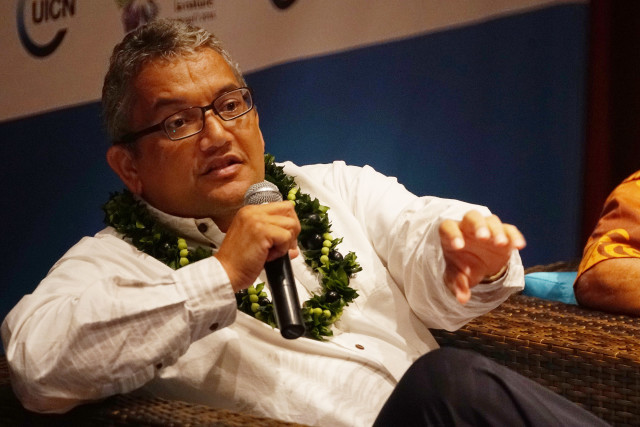One of the most popular politicians in recent Hawaii history has died.
Billy Kenoi, the former mayor of Hawaii County, was 52. Hawaii News Now first reported the death Tuesday but news reports and condolences soon were flowing in.
His family “expressed appreciation for an outpouring of aloha” from the community, HNN reported.
Hawaii Gov. David Ige issued this statement upon learning of the late mayor’s death: “Billy Kenoi was an energetic and inspirational leader who had a knack for bringing people together. His death is a huge loss for our community.”

Senate President Ron Kouchi is among many local leaders also remembering Kenoi.
“Even in the midst of his own health challenges, Billy continued to inspire those around him through his warm sense of humor and his gift of oratory,” Kouchi said Tuesday in a statement. “My heartfelt aloha goes out to his wife — Takako, his children — Liam, Justin and Mahina and the rest of the Kenoi ohana.”
House Finance Chairwoman Sylvia Luke learned of Kenoi’s death during a committee hearing Tuesday afternoon.
She asked her committee to take a moment of silence for Kenoi, who was her classmate, she said while holding back tears.
During the meeting, Honolulu Mayor Rick Blangiardi said he recently had dinner with both Kenoi and Hawaii County Mayor Mitch Roth.
“That’s just really shocking,” Blangiardi said of the news of Kenoi’s passing.
U.S. Congressman Kai Kahele, whose 2nd Congressional District includes Hilo, said, “Throughout his life, and especially as a leader of the people, Billy always had the attitude that anything is possible. In what would become a viral commencement address to Hawaii Pacific University graduates, Billy said, ‘there is no such thing as no can … always can!’”
Kenoi was first elected mayor in 2008 at the age of 39. He was reelected in 2012.
He previously served as a legislative aide in the Hawaii House of Representatives and Senate, as an intern to U.S. Sen. Dan Inouye, as a deputy public defender and as an executive assistant to then-mayor Harry Kim, who preceded and succeeded Kenoi in office.
He was a 1996 graduate of the William S. Richardson School of Law at UH Manoa.
Kenoi revealed in 2018 that he had a rare form of leukemia and was undergoing treatment on the mainland.
While popular, Kenoi sometimes made headlines that he regretted.
In 2015, then State Attorney General Doug Chin accused Kenoi of misuse of a government credit card from 2011 to 2015.
As HNN reported in 2016, Kenoi was indicted on two counts of second-degree felony theft, two counts of misdemeanor theft, three counts of tampering with government records and one count of false swearing.
By November of that year, however, a Hawaii island jury found Kenoi not guilty on all charges related to his “alleged misuse of a county-issued purchasing card,” known as a pCard.
“Kenoi apologized publicly after the scandal and at his trial said he never meant to hurt the community,” the HNN report said. Kenoi reimbursed the county $31,112.
Kenoi continued to be influential and inspiring even while dealing with his illness.
Civil Beat columnist Lee Cataluna in November wrote about Kenoi’s “powerful message” to the Chamber of Commerce Hawaii that month. He inspired the audience to not give up hope even in the midst of the coronavirus pandemic.
“Here in Hawaii, our kuleana is our kuleana. Our values, our existence on an island community 2,500 miles from anywhere else in the world, is our strength,” he said, speaking via a recording from his home in Volcano and hooked up to oxygen support. “All we have to do is look to each other for the solutions to the challenges we’re facing.”
Services for Kenoi are pending. Ige will order flags to fly at half-staff in honor of Kenoi on the day of his memorial service.
Civil Beat reporter Blaze Lovell contributed to this report.
 Sign up for our FREE morning newsletter and face each day more informed.
Sign up for our FREE morning newsletter and face each day more informed.
We need your help.
Unfortunately, being named a finalist for a Pulitzer prize doesn’t make us immune to financial pressures. The fact is, our revenue hasn’t kept pace with our need to grow, and we need your help.
Civil Beat is a nonprofit, reader-supported newsroom based in Hawaiʻi. We’re looking to build a more resilient, diverse and deeply impactful media landscape, and we hope you’ll help by supporting our essential journalism.
About the Author
-
 Chad Blair is the politics editor for Civil Beat. You can reach him by email at cblair@civilbeat.org or follow him on X at @chadblairCB.
Chad Blair is the politics editor for Civil Beat. You can reach him by email at cblair@civilbeat.org or follow him on X at @chadblairCB.



